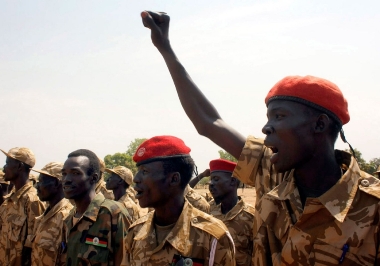HIV/Aids remains a threat within army: officials
February 17, 2017 (BOR) – Human Immunodeficiency virus (HIV), a major cause of the Acquired Immuno-deficiency Syndrome (AIDS) is a major threat affecting the men and women in national army and other civilian protection forces in South Sudan.

“In October up to November last year, we have tested 1,500 soldiers of uniform forces, interior and wildlife, among them there were 44 HIV positive which indicated there is a threat”, Major Kuol told reporters in Bor on Thursday during HIV/AIDS awareness workshop conducted by International Organization for Migration (IOM).
The number of infected individuals in the army could be more than expected, he said.
The sensitization workshop was attended by 40 commanders drawn from SPLA, wildlife, police, civil defense and prisons with an objective of sensitizing them about the threats of HIV and AIDS, according to the workshop organizers.
Commanders who attended the workshop said any detail to conduct general test and awareness about the disease would be tolerated in the army and organized forces.
“We are to start right away to know our status immediately because it is a disease which is hiding in our blood whenever we meet with women”, said brigadier general Atem Manyok and director of wildlife who also attended the HIV/Aids workshop.
In September 2014, South Sudan Aids Commission raised an alarm about the swiftly-rising HIV/Aids pervasiveness rates, amidst the conflict that engulfed the nation, displacing millions of its civilians.
South Sudan, according the commission, is one of the sub-Saharan countries relatively hard hit by impacts of the deadly disease today.
During the UN high level meeting on HIV/Aids in New York in June 2011, a new declaration, entitled “Political Declaration on HIV and AIDS: Intensifying our Efforts to Eliminate HIV and Aids was unanimously adopted by member states on 10 June. The declaration set new targets and called on member states to redouble efforts to achieve by 2015, universal access, with a view to attaining the Millennium Development Goals. The declaration also recognised key populations at higher risk of HIV infection, citing men who have sex with men, people who inject drugs and sex workers.
(ST)
